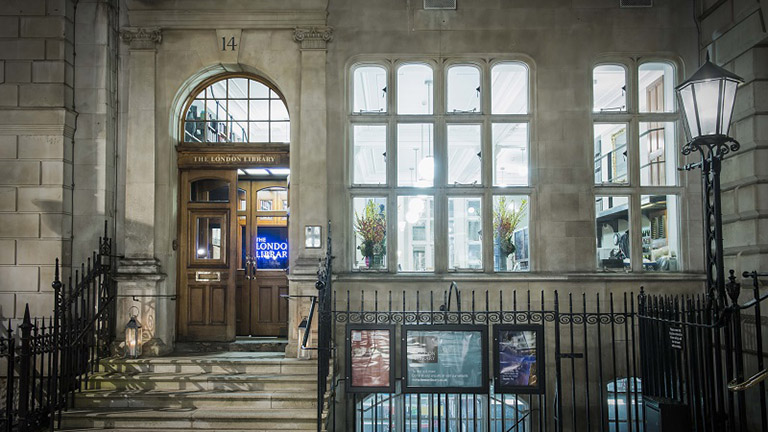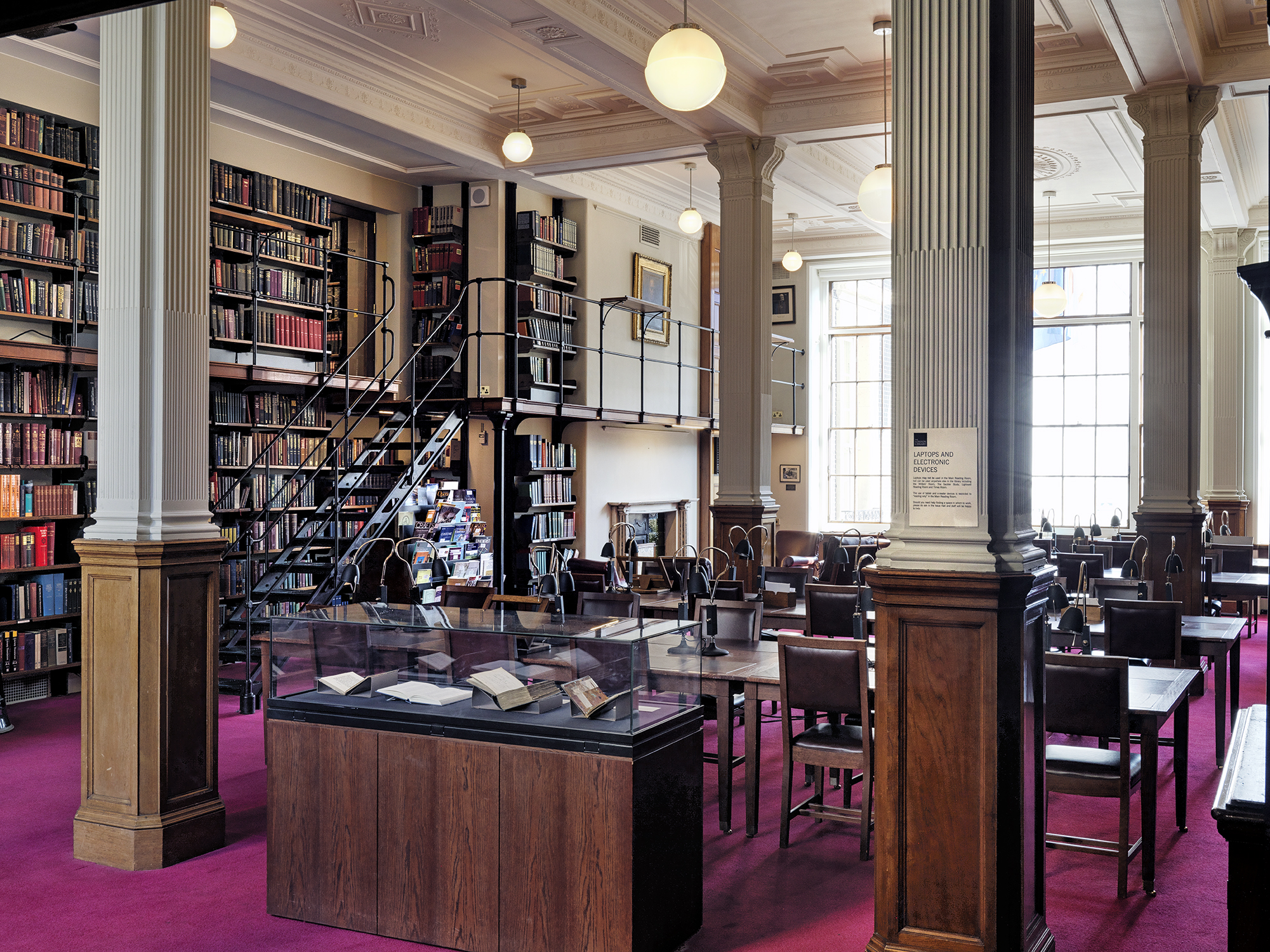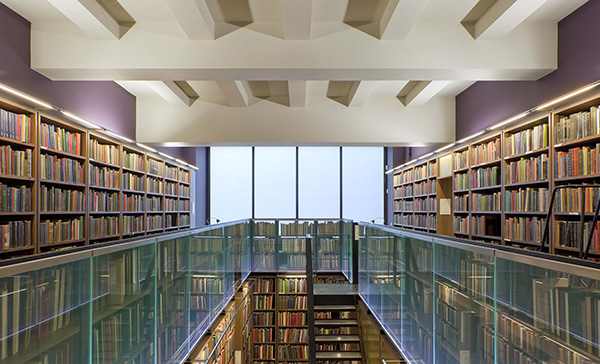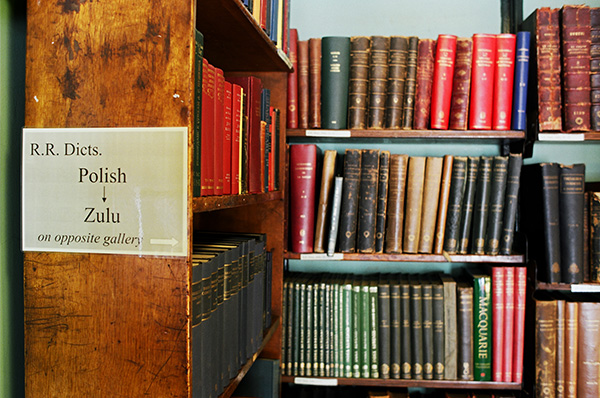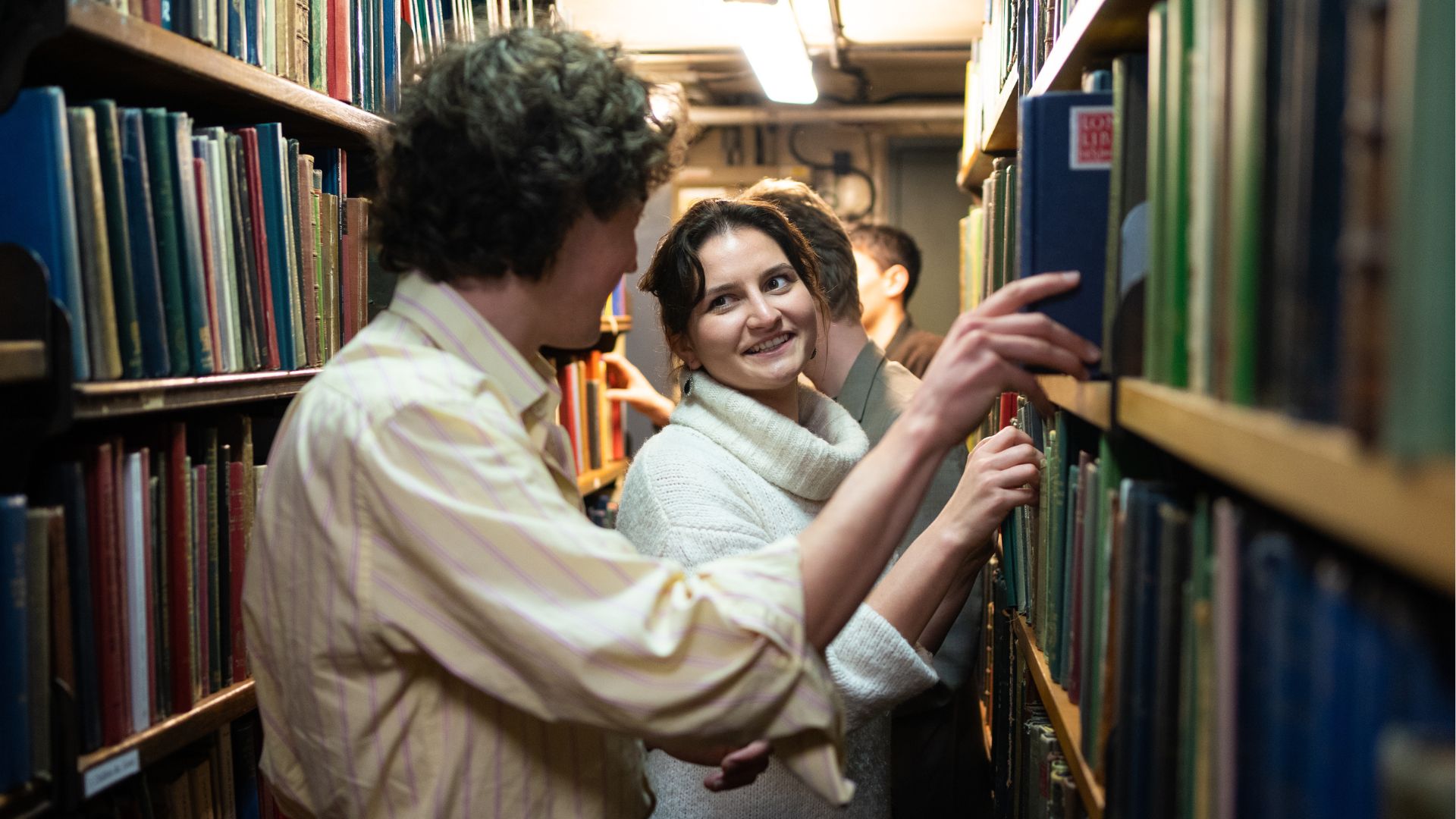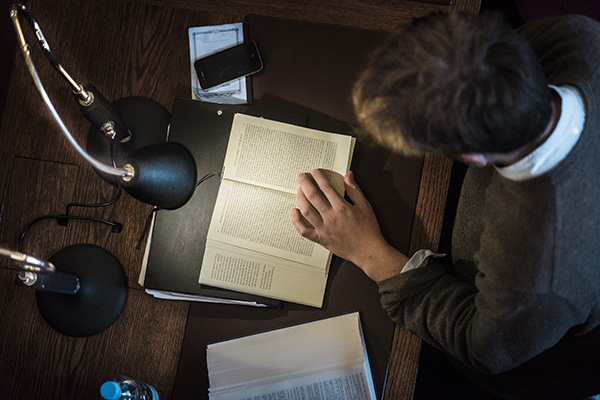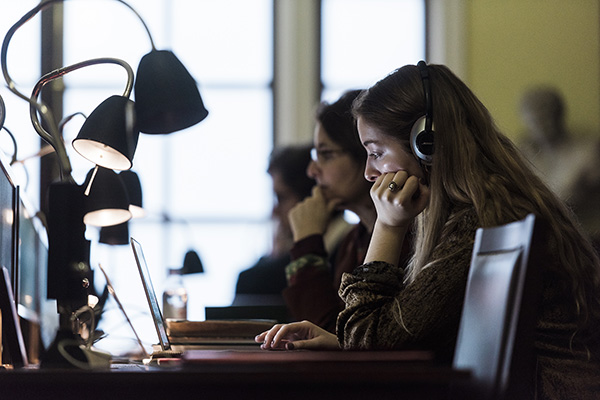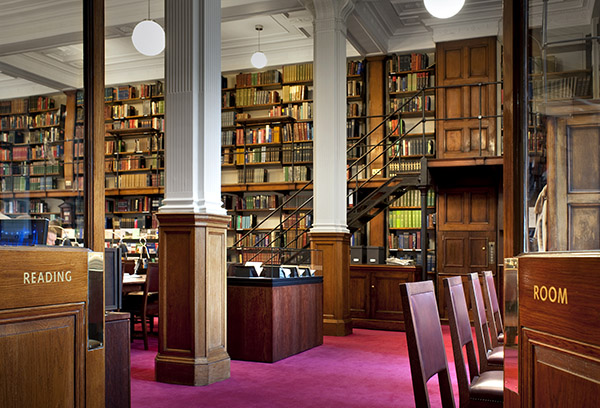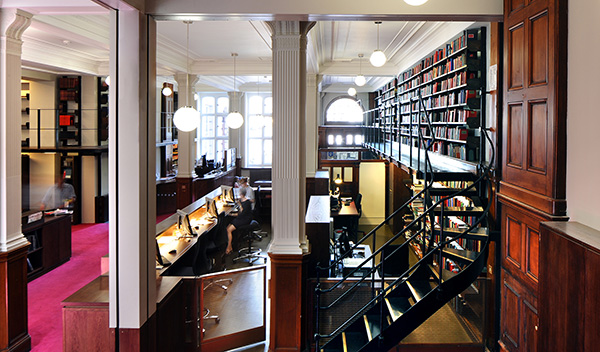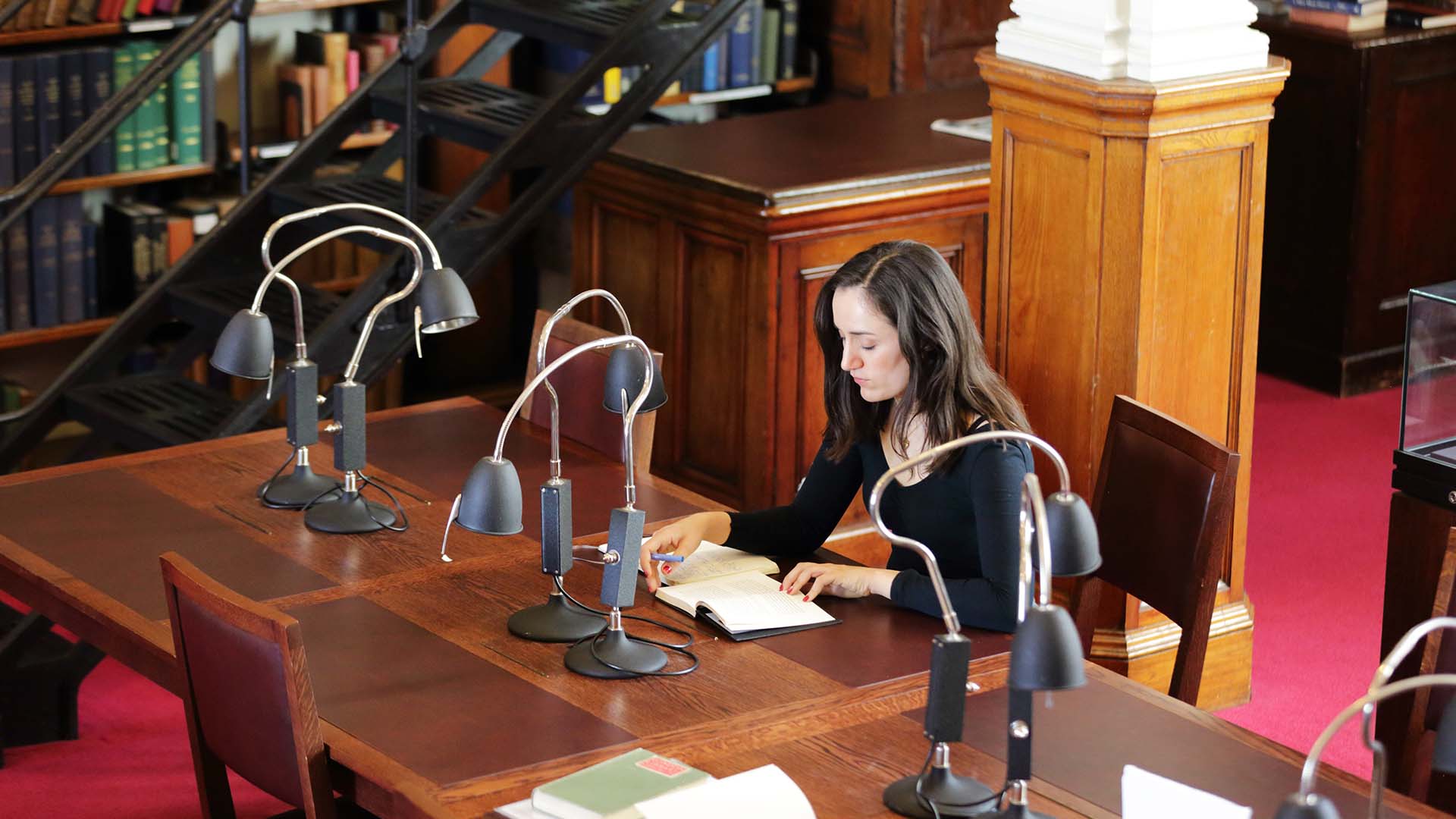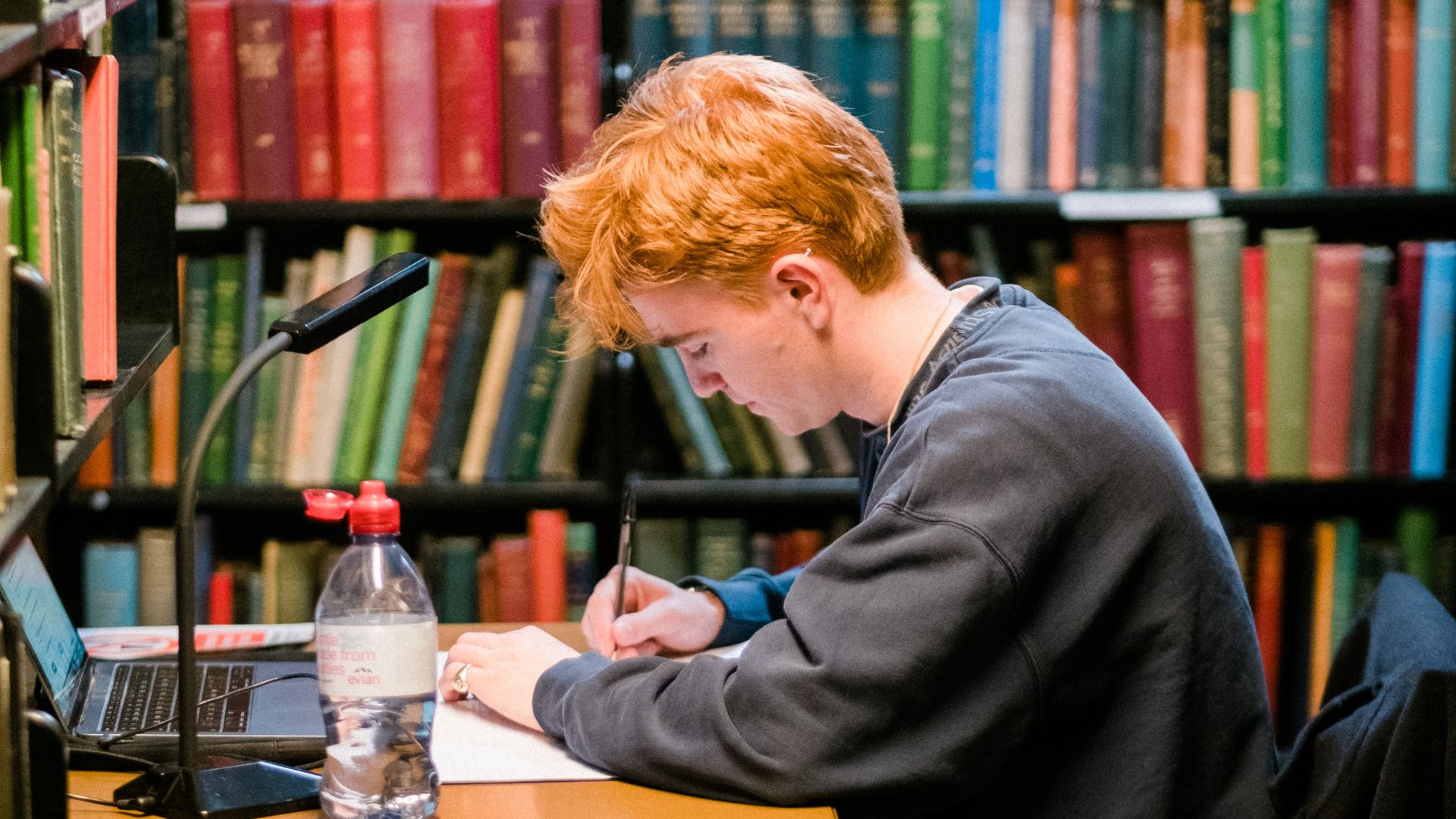
‘Dead Room’ - Mark Harris
Over the past 12 months artists Mark Harris and Bob Matthews have been immersing themselves in the collection of The London Library. This month a number of striking artworks based on the images they have found, have gone on display in the Library.
They include three large scale works - Harris’ “Dead Room” and Matthews’ “Capsule” and “Talisman” - which can be found in the Periodicals stacks and Times Room. 15 smaller pieces can be found at various locations in the Central stacks, Back stacks and Art stacks (see map). The works - which have been produced free of charge to the Library as part of Bob and Mark’s artists’ residency - will be on display for most of 2020.

L: ‘La Houle’ - Mark Harris, R: ‘Elements of Editing 2’ - Mark Harris
Looking at the collection through the visual lens
During an intense period of research Mark and Bob developed methodologies for browsing, selecting and editing visual material, and as a consequence recorded 1000’s of images digitally. The act of collecting these images has helped them capture a unique pictorial world history spanning some 300 years. Their selection process would lead eventually to dozens of significant images to work from, creating inspiration for new artworks.
As printmaking specialists, Harris and Matthews were initially drawn to the way the Library’s collection reveals the history of the printed image. The collection holds significant examples of early engraving, etching and lithography, as well as more recent photographic printing techniques. This would lead to Harris producing Cyanotypes, an early direct photographic technique identified by its Prussian Blue appearance and ability to capture both photographic and autographic marks. Matthews technical research in the library would lead to the production of artworks using the photo-toxicity of lemons to aid the transfer of images.

‘Capsule’ - Bob Matthews
Within the Library the Periodicals section was an area that revealed many images of interests, from the 18th Century Journals of Italian Letters through to the collection of BBC Handbooks. Both artists were drawn to the idea of making site-specific artworks for the Periodicals space that would bring together a number of ideas from their research across the library. They have produced large scale pieces that are revealed through the movement of the shelving mechanism, echoing the action of a printing press. This deliberate obstructive presentation of the work refers to the many folded pages of images and diagrams that they discovered.
Additionally, across 3 levels of the Central Stacks Harris has produced a series entitled Elements of Editing that comment on the joint industrial journey that both materials and images take, as they are mined and captured, refined and edited, produced and published. Other artwork is situated throughout the Back Stacks.

‘As it Might Be...’ - Mark Harris
Bob Matthews and Mark Harris commented, “It has been an enriching and fascinating experience exploring the visual material held within the Library. We hope that the work will suggest alternative ways to access the collection and that we have sewn a seed for many more potential future projects between The London Library and the visual arts.”
The London Library is to reopen its doors to members on 6 July, following over three months of closure under lockdown.
The move follows the Prime Minister’s confirmation that libraries will be included among the cultural institutions able to open from early July as part of the relaxation of lockdown restrictions.
From 10.00am on Monday 6th July the Library will be open six days a weeks and nearly two thirds of its desks will be available for use, enabling members to access one of the most atmospheric working spaces in London.
Under the reopening plans, special arrangements have been put in place to ensure that staff and members can work safely in the Library’s vast building which contains over 1 million books - almost all of which are available for borrowing. Book quarantining measures will enable members to borrow books and browse the Library’s 17 miles of open access shelves; specially constructed lanes and entrance arrangements will support physical distancing as members enter and leave the building; a pre-booking system will be in place so that numbers in the building can be maintained at appropriate levels.
The reopening of the building comes after an unprecedented effort in which the Library has run an extensive postal loans service, enabling members to borrow books by ordering them online and having them shipped free of charge. With over 500 books being mailed out each week, thousands of books have been lent out during the lockdown period, providing a lifeline to readers and researchers. In addition, members have had full access to the Library’s extensive online resources which provide online facilities equivalent to those of many of the best academic libraries.
London Library Director Philip Marshall commented, “Books are so important at this time and we've been delighted throughout lockdown to continue providing extensive access to the collection via postal loans. We can now open the Library building itself and it’s wonderful to be able to invite members back into London’s great working spaces.”
Reopening arrangements:
- From 6 July the Library will open at 10am Monday to Friday and 9.30am on Saturdays. Normal closing times will apply
- Over 60% of the Library’s desks will be in operation, providing socially distanced working space for 84 members at a time.
- Members will need to pre-book a day pass to work in the Library or browse the collection, and will also need to book a time-slot if they are looking to collect and return books.
- All the Library’s book shelves containing its 1m strong borrowing collection will be available for browsing.
- Once books are handled, they are quarantined for three days. Enhanced sanitisation and cleaning routines will be in operation across the Library.
- Perspex screens and lanes have been installed in entrance and reception areas to enable social distancing and prevent queues.
- A one way in/out system will be in place with members asked to enter via St James’s Square and leave via Mason’s Yard. Mason’s Yard will no longer be an entrance route.
- Some facilities will not be available, including lockers and storage facilities, reprographic services and kitchen facilities for members.
Find out more at londonlibrary.co.uk/reopening.


The London Library has announced the names of the second group of writers who will benefit from its Emerging Writers Programme. Of the 40 writers selected for the Emerging Writers Programme: 4 are poets; 6 are playwrights; 6 are screenwriters; 6 are planning non-fiction books and 18 are planning to write fiction. 12 of the writers are under 28. See the whole cohort here.
Isabelle Dupuy, Chair of the judging panel, author and trustee of The London Library comments;
'It's been a great honour to chair our Emerging Writers Programme this year. We had just reached the deadline for submissions when our lockdown began. Reading through over eight hundred writing samples ranging from non-fiction to poetry to screenplays with topics going from president Truman being told about the nuclear bomb to the impressions of a newly arrived Jamaican boy at a London comprehensive gave us all a deep appreciation of the talent, energy and range of voices striving to emerge in London and beyond. This is a historical year. Never before in my lifetime have I seen such an interest in changing the nature of the narrative in our country. We are convinced the cohort of 2020 will play an important role in shaping this new narrative. On behalf of The London Library, thank you.'
The Library’s Emerging Writers Programme is geared towards supporting writers at the start of their careers and helping develop their work. Participants benefit from one year’s free membership of The London Library (which normally costs £540 per annum) alongside a programme of writing development and networking opportunities, peer support and guidance in use of the Library’s resources.
During the year participants will get free access to the Library’s unique collection which includes over one million books and over 2,500 periodicals titles that can all be borrowed. Membership also includes access to extensive online resources and dedicated writing and research spaces in the Library’s extraordinary building in central London.
The candidates were chosen from a field of over 800 applicants and joining Isabelle Dupuy on the judging panel were: Bidisha (broadcaster, writer and film maker); Eleanor Greene (Executive Producer, Drama at Wall to Wall Productions); Daniel Hahn (writer and translator); Victoria Hobbs (agent at AM Heath), Karen McCarthy Woolf (poet); Amy Rosenthal (playwright) and Anna Whitwham (novelist).
Sian Chaney-Price, a participant in the first year of the Emerging Writers Programme which has recently finished comments; “The Emerging Writer's Programme has helped me to find a writing community when working at home can sometimes be lonely and isolating. It gives me monthly motivation and support when I need it and it is exciting to be surrounded by such a range of writing and creative ideas. The writing history of the library and the wealth of resources are awe inspiring and could provide a writer with enough ideas to never suffer from writer's block. The year has flown by and none of us want to leave!”
The London Library Emerging Writers Programme is only possible because of the generous support The London Library has received from A M Heath Literary Agency, The Bryan Guinness Charitable Trust, Adam and Victoria Freudenheim, The Golden Bottle Trust, Max Hastings, the Julio and Maria Marta Núñez Memorial Fund, O J Colman - Charitable Trust and other anonymous donors. If you are interested in supporting the Emerging Writers Programme please contact This email address is being protected from spambots. You need JavaScript enabled to view it. or donate online.
The 2021-2022 London Library Emerging Writers Programme will open for applications in January 2021 and applicants will have until March 2021 to submit their application. The programme will then run from 1 July 2021- 30 June 2022. To apply you will need to submit a short application form detailing your relationship to writing, why you would like membership of both the Library and the programme, a short description of the project you intend to work on throughout the year and a 1200 word sample of your work. Please sign up to our mailing list here for notifications about the programme and the application process.
Read more about the Emerging Writers Programme.
EWP Anthology Vol II
The London Library launched a free-to-download anthology of writing by the second cohort to take part in the Emerging Writers Programme. From the Silence of the Stacks, New Voices Rise Volume II is available to download from The London Library’s website and as an eBook on Kindle (costing £2). A limited print run of a physical edition is also available here for £8.
Read more: The London Library Emerging Writers Programme 2020/21
As we commemorate the legacy of Charles Dickens - who died 150 years ago on 9th June 1870 - we’ve been digging through the archives, finding some of the remarkable associations Dickens and his close circle had with the Library in its early years.
Dickens was a Founder Member of the Library - one of the 500 who in 1840 answered Thomas Carlyle’s call to help fund a lending library in the capital. By that time he was emerging as a major literary name, having written five bestsellers in book and serial form in the space of just four years - Sketches by Boz (1836), Pickwick Papers(1836-37), Oliver Twist (1837-39), Nicholas Nickleby (1838-39) and The Old Curiosity Shop (1840-41). His name appears on the Committee running the Library between 1846-47 and he may well have been a full Committee member before that.
What may have spurred Dickens’ involvement in the early story of the Library is the fact that among the 528 Founder Members are some of his closest friends and associates, including perhaps the most important person in Dickens’ life - John Forster.
John Forster
Forster was Dickens’ lifelong friend, a major influence throughout his career and godparent to Dickens’s first daughter. He was also central to the Library’s foundation, devising and promoting the original subscription scheme and working tirelessly as one of the original Committee members running the Library when it was first established.
Forster’s literary importance was built on his role as Literary Editor (and subsequently Editor) at The Examiner. It was there, in 1835, when he first met Dickens (as serialisations of Sketches by Boz were beginning to appear) and he rapidly assumed the role of Dickens’ unofficial business manager, negotiating publishing contracts, advising on plots (the death of Little Nell was at his suggestion) and reading all Dickens’ proofs. In later years, Forster wrote a major biography of Dickens and claimed that, “There was nothing written by him... which I did not see before the world did, either in manuscript or proof”.
William Macready
William Macready is another of Dickens’ close associates who joined the Library as a Founder Member. The 44 year old actor was first introduced to the 25 year old author in 1837 by John Forster after a theatre performance in Covent Garden. The pair became firm friends. Nicholas Nickleby (1838) was dedicated to Macready who became godparent to Dickens’ third child the following year. Macready then had a key role to play in the Dickens’ family in 1842, helping look after their three children when Dickens and his wife Catherine went on a gruelling six month tour of the USA.
George Cattermole
George Cattermole was the illustrator of The Old Curiosity Shop and Barnaby Rudge which were published in book form in 1841 and 1842 respectively. Cattermole worked closely with Dickens throughout 1840-41 when these works were being serialised in instalments in the Dickens publication Master Humphrey’s Clock. During that period Cattermole joined The London Library as a Founder Member.
Daniel Maclise
Painter Daniel Maclise also became a London Library Founder Member in 1840. He had been a firm friend of Dickens and Forster since the late 1830s and in 1839 painted one of the most famous of the known Dickens portraits (shown above) - commissioned by Chapman & Hall and exhibited to acclaim at the Royal Academy in 1840.
Thomas Carlyle
The Library’s founder Thomas Carlyle had made his name with the publication of The History of the French Revolution in 1837. Dickens first met Carlyle at a dinner given three years later, when Carlyle was first hatching his Library plans. The pair admired each others’ work and shared social circles, not least because Carlyle was also a close friend of John Forster. Dickens dedicated Hard Times (1854) to Carlyle and A Tale of Two Cities (1859) was inspired by Carlyle’s History of the French Revolution. Indeed, it was partly researched under Carlyle’s guidance - Carlyle personally selected a number of London Library books on the French Revolution and sent them over to Dickens’ house in a cart. It is very likely that several books we still have on our shelves - and which have been there since the day the Library first opened its doors - were among them.
Thomas Talfourd MP
Dickens dedicated Pickwick Papers to Thomas Talfourd in 1837 having been introduced to the Liberal MP earlier that year by John Forster. Talfourd is another member of the Dickens/Forster circle who joined the Library as a Founder Member in 1840.
Edward Chapman and William Hall
From 1837, alongside his role as Literary Editor on The Examiner and Dickens’ unofficial business manager - John Forster also worked as chief literary adviser for publisher Chapman & Hall. Chapman and Hall had signed up Dickens for early sketches for Pickwick Papers the year before and would remain his publisher for over 20 years, publishing most of his works during that period. Edward Chapman and William Hall both joined The London Library as Founder Members in 1840.
Carlyle’s vision of a lending library in London came to fruition through the dedication and support of a group of figures whose early commitment helped the Library open its doors on 3rd May 1841. The list of those Founder Members shows that Charles Dickens and his most intimate circle - with John Forster at the centre of it - were a vital part of that story.

